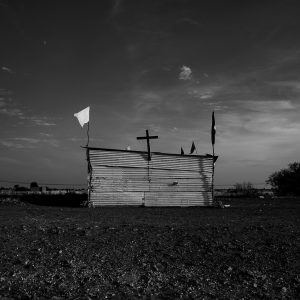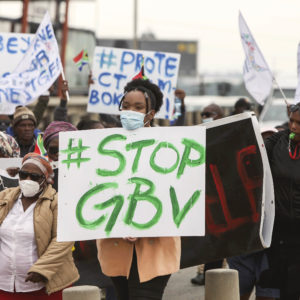Cape Town ‘spiritual master’ accused of abuse
Rachide Mansouri allegedly exchanged promises of enlightenment for sexual favours and took financial advantage of the faithful for years. The revelations have left his community in disarray.
Author:
8 December 2021

“I will follow you until my death Habibi… In jannah [heaven] or jahannam [hell],” states an incoming message in a public WhatsApp group, from Idris Panchard to his spiritual master, Rachide Mansouri, in an expression of blind loyalty.
“Rot in hell eternally,” retorts a message in response from *Marwaan, disillusioned by the man he once also followed devoutly.
Until early in 2020, Marwaan considered Rachide Mansouri his spiritual leader, but he now regards him a charlatan.
Mansouri, 48, of Algerian descent, stands accused of the sexual abuse and financial exploitation of his devotees, referred to as fuqara (the singular is faqir) in Arabic.
Related article:
Mansouri became the murshid or spiritual head of Tariqah Alawiyyah in 2005 when his predecessor in Algeria, Ahmad Badr al-Din, died. The original tariqah was founded by Shaikh Ahmad Al-Alawi in the early 20th century. The life and work of Al-Alawi is celebrated in A Sufi Saint of the Twentieth Century by Martin Lings. While the Alawia tariqah is very large and has branches all over the world, the Mansouri section is relatively small and has an estimated 1 000 followers in several countries, including Malaysia, Switzerland, France and Germany.
Mansouri settled in Cape Town in 2008 and he is alleged to have “surreptitiously groomed his victims with the promise of spiritual enlightenment”. Another allegation is that he received vast sums of money from fuqara to sustain a lavish lifestyle.
Five men have provided detailed accounts of their encounters with Mansouri. Their stories reveal manipulation and the devastation of marriages, family ties and close friendships. Mansouri allegedly promised his victims an elevated spiritual position in return for unquestioning devotion to him as spiritual head.
Hundreds of families have been affected by the scandal and dozens torn apart. The men added that the faith of many fuqara has been shaken.
‘Disillusioned and confused’
The scandal first broke on 17 February 2020 when Marwaan addressed 247 of his peers on a WhatsApp group. He announced his departure from the tariqah, explaining that he now realises that for his “entire adult life” he had been following a “false murshid”. Marwaan urged others not to follow the “pig” whom he accused of abuse of power and turning the tariqah into a “depraved and sick personality cult and wicked money-making scheme”.
Marwaan’s revelations marked the first rupture in the tariqah. Some have expressed support for Mansouri, but the majority questioned his leadership. It is estimated that in Cape Town a minority remain loyal to Mansouri while the vast majority demand that he be held accountable for the allegations against him.
Internationally the tariqah has descended into chaos as many of its members have turned against Mansouri. Invariably, “in every city there is an ambivalent majority who became totally disillusioned and confused”, says *Yusuf who was a friend of Mansouri and a member of the tariqah for 22 years.
Keltoum Mansouri, 39, Mansouri’s estranged wife says she started questioning her husband about five years ago regarding the frequency and secrecy surrounding the visits of two men to their home in Constantia. He told her that they love him, yet assured her that there was nothing wrong. But Keltoum was not convinced. In January 2020 she hid a phone to record the events in the room where Mansouri met his companions, each on different days.
Related article:
She says she obtained two video recordings this way. Both videos allegedly reveal his sexual misconduct. A week later, says Keltoum, Mansouri told her that she no longer loves him because she is possessed by a jinn [supernatural creature]. Outraged, she confronted him with the video evidence and a fight ensued. She demanded that he give up his role as murshid and that the family return to Algeria. According to Keltoum, her husband admitted his “infidelity” and agreed to her demands at the time.
Keltoum recalls how their lifestyle had always been about material comfort financed by the fuqara. This included private schooling for their children, medical aid and holidays in the Maldives, Bali and Dubai. Meals and shopping expenses on these holidays were paid for by the fuqara. Keltoum says before her husband became a murshid he was an ordinary grocer in Algeria.
Sources close to Mansouri say he earned a nominal monthly salary of R9 000 as an employee of Keep the Dream 216, a non-profit organisation created to manage the business affairs of Tariqah Alawiyyah. According to these sources, Mansouri is maintained by local fuqara at an average monthly cost of R36 000, and he lives in a Constantia home valued at R6 million. In addition, he allegedly benefits from “secretly channelled” funds of $30 000 to $40 000 a year from international fuqara.
Consolidating power
It appears the main reason for the current state of discord in the tariqah is Mansouri’s short-lived resignation as murshid. A few days before Marwaan’s WhatsApp post, Mansouri and Keltoum met with another faqir, *Igsaan, to discuss how all the fuqara of the tariqah would be notified of Mansouri’s resignation.
Igsaan confirms that this meeting took place and that he had already been advised of Mansouri’s willingness to relinquish his position and his intention to return to Algeria. Igsaan also says he helped Mansouri draft a WhatsApp message announcing his resignation. Mansouri posted this message to the fuqara on 18 February 2020. On the same day, Mansouri resigned as an employee of Tariqah Alawiya.
Related article:
Soon thereafter, Mansouri allegedly acted strategically and sources say he proceeded to consolidate his power, albeit with a significantly diminished base. He ordered the closure of the WhatsApp groups, as well as the international centres of devotion. According to Yusuf, this was done to secure his control over the communication of his loyal fuqara and their access to information.
Yusuf adds that Mansouri approached especially the wealthy and influential fuqara, most of whom were part of his “inner circle”, and persuaded them that those questioning his conduct were bent on destroying him.
The black magic defence
Mansouri’s defence is that he has long been afflicted by “black magic”. This defence is rejected by his critics in the tariqah.
Mansouri is alleged to have been subjected to exorcism, but has not been “healed”. In March 2020, following the exorcism, says Yusuf, Mansouri’s accusers issued him with a series of demands. This included vacating his position as murshid and returning to Algeria.
Omar Salah, 52, is a Swiss national and the organiser of the Swiss fuqara. He joined the tariqah in 1994 and is a close friend of Marwaan. Salah’s account of the sexual nature of the relationship between Mansouri and Marwaan is consistent with the revelations in Marwaan’s WhatsApp message in February 2020. Marwaan has not agreed to an interview, but Salah shared the relevant communication.
Salah describes how Marwaan completely gave himself over to Mansouri and how kissing and touching was part of the “spiritual approach”. He says Marwaan was oblivious to the manipulation until his wife confronted him and asked if he knew that Mansouri was doing this to other men.
According to Salah, the manipulation was so deep that fuqara would blame themselves. He says that in Marwaan’s case, the consequences were devastating. His marriage and relationships with his children have almost certainly been irreparably damaged, and his family is now disillusioned with Islam.
Related article:
Following the disclosures made by the first five men interviewed, another 12 fuqara, including five women, came forward to speak about their experiences in the tariqah. Most of the men who had allegedly been sexually manipulated by Mansouri requested anonymity.
*Gamiet says Mansouri was given at least three opportunities to quietly step down as murshid. But he denied the allegations and threatened legal action. Mansouri is now apparently desperate and relies on the funding of the few wealthy fuqara to maintain his hold on power, says Gamiet.
*Ali offers a detailed account of how, for about two years, he was allegedly subjected to Mansouri’s abuse. On the night of Laylatul Qadr (usually the 27th night of Ramadan), in October 2008 in Cape Town, three men were invited to sleep over at Mansouri’s home. This is where, once alone, Mansouri made sexual advances and advised Ali that his status with Allah would be elevated.
Ali says that this was later followed by sexual acts that continued until 2011. Ali explains that, like many other fuqara, he was somehow overcome by an impulse to please Mansouri as a means to achieve a higher spiritual state.
Devastated families
The wives of Mansouri’s alleged victims speak of the impact it has had on their marriages and families. Three couples are already divorced and seven others are estranged. Some are in the process of divorcing.
*Zahra says that after two decades of total devotion to the tariqah she lost her husband to Mansouri. She says her husband was one of the men invited to Mansouri’s group prayer sessions.
Zahra is among the women in the tariqah who now lament the compromise of their marriages. They were allegedly deluded into believing that their sacrifice would be rewarded with their husbands’ access to Mansouri’s privileged inner circle of mostly wealthy fuqara. Zahra says her husband spent so much time with Mansouri over the years that she effectively raised their children alone. Had she questioned this sacrifice, it would have been deemed sacrilegious and a sign of weak faith.
Related article:
Yet for some, including some women, the bond of loyalty to Mansouri remains invulnerable. They accept the black magic explanation. Zahra and her parents are now estranged from her siblings, who remain loyal to Mansouri.
She adds that the affected women of the tariqah feel powerless and that it is the men’s voices that lend credibility to theirs. Igsaan is one of the men who supports the disenchanted women of the tariqah.
*Aadila, whose ex-husband was allegedly sexually manipulated by Mansouri, says her ex-husband sincerely sought spiritual growth, but was misled. Aadila’s former spouse also remains loyal to Mansouri. One faqir, in an open letter to Mansouri and all fuqara, describes the trail of devastation as “nightmares, disturbed sleep, depression. Anxiety. Loneliness. Shame and self-accusation … You really destroyed their lives.”
To compound matters, Mansouri is threatening legal action.
Legal threats
Mansouri’s lawyer, Fareed Moosa, has threatened at least eight fuqara with legal action. Sources reveal that Moosa’s brother Riaz is also a member of the tariqah. Mansouri denies all allegations against him. But he has made a number of key admissions.
The first admission occurs in Moosa’s legal correspondence with disenchanted fuqara. They have been threatened with legal action should they be found to have distributed the contents of the video footage of his alleged abuse recorded by Keltoum.
The dissenting fuqara approached the Muslim Judicial Council in South Africa for a fatwa (ruling within Islamic law) with a view to obtaining an opinion that Mansouri’s conduct is in breach of basic Islamic values. On 24 August 2020, the council issued a generic fatwa that does not specifically reference Mansouri, but that categorises his alleged misconduct as a “major sin”.
We contacted Mansouri for a response to the allegations against him, as well as Moosa with relevant questions. Mansouri did not answer any questions and instead threatened, via his lawyers, to sue for defamation and other legal action.
*Names have been changed.





